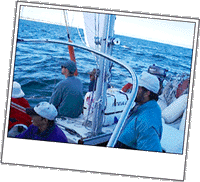Setting sail, and the forecast calls for . . .Lindsay
McRory
September 26, 1995
Well, I can be quoted as saying the odds of us getting into a serious
storm are infinitesimally small. Proper prevention is the key: watching
weather carefully, planning for emergency stops, and being well-prepared.

As infinitesimally small as the odds were, the north Atlantic gave us a
hell of a spanking our first night out. The storm, which escaped the
notice of most forecasters, sunk three fishing boats, one being only 15
miles north of our position.
The morning forecast called for moderate winds and clear skies and
nothing but a bit of rain in long-range forecasts. Hurricane Marilyn was a
long way south of us and would not present a problem until we were in the
Cape Cod area.
By mid-afternoon the forecast had changed to gale-force winds and hard
rain. No problem. We planned our bail-out stops and secured as much
gear as possible. Starting at 6 p.m., the winds just kept building and
building. By 9 p.m., the forecast was for a full storm with sustained
winds of 70 mph gusting up to 90 mph, with driving rain.
By 9 p.m., we were 30 miles from shore with the storm right on our
nose. The wind was blowing from the southeast which made the entrances to
our bail-out harbors too dangerous. With this option closed, we had no
choice but to ride it out.
By 10 p.m., only the smallest piece of sail was up (reefed) in an
attempt to keep the boat from broaching violently in the waves. Even
though the boat was facing northeast and traveling at 7 to 10 mph, the
swell forced our course over the ground to due south. This was good, as
long we didn't get broached ( rolled upside down by a wave) we were in
good shape.
The safety locker had been broken open--harnesses and strobes for
everyone on deck. We plotted our position off GPS and radar every 30
minutes. The wind and waves continued to build and build. The rain was
horizontal and completely blinding. Hakuna Matata would launch off
a wave and seem suspended in mid-air. An eerie silence surrounded the boat
before being smashed into the trough of the next wave. The boat would then
accelerate wildly through the wave before another launch.
This cycle repeated itself for the next 6 hours.
At 2:30 a.m., I fixed our position on the chart. We were still in good
shape, although the Nova Scotia coast had moved in on us; there was now
only 10 miles separating use from a rocky, hostile shore. The 3 a.m. fix
was disastrous; in 30 minutes we had drifted almost three miles due west.
The wind was now due east and trying to force us onto the rocks.
The engine was turned on so we could motor sail in an attempt to claw
our way off the coast. By 4 a.m. we had lost a few more miles and were now
only 2 miles from being blended into the shoreline. In a flash the boat
filled with smoke! The engine room was on fire! The engine stopped, two
crew were dedicated to trying to sail us off the shore, another three went
to work on the engine. The source of the smoke tuned out to be a wire
harness that was used to put the batteries into their boxes. The harness
had become dislodged and fell across exposed terminals. In 20 minutes we
had the offending wire cut out and the engine was going again.
We had managed to worked our way south enough to get into a very small
harbor. Port Mouton, Nova Scotia, is a difficult little harbor to get into
in the daytime, let alone at night in storm conditions. It's a shallow
little harbor littered with shoals and reefs that have no obvious pattern.
Not one of our bail-out places.
With some great crew work, a large searchlight, and a lot of luck we
found ourselves tied up to a coast guard dock at 6 in the morning. Even at
dock the boat took a walloping; we had fenders and lines everywhere.  
The final damage toll was relatively minor: broken battens in the main
sail, a ripped main and mizzen sail and some of the new radio gear had
packed it in. It looked like someone threw a grenade into the interior.
By noon the storm had pasted, we casted off a little tired and rattled
but no less intent on getting to Norfolk.
| 



